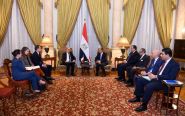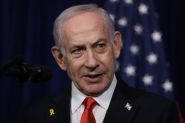In an address to the United Nations General Assembly on Friday, Israeli Prime Minister Benjamin Netanyahu reopened the door to peace with Lebanon. He declared that “peace between Israel and Lebanon is possible,” contingent on the disarmament of Hezbollah. “If Lebanon takes action to disarm Hezbollah, I’m confident peace will follow,” he told the international assembly.
Until that happens, he warned, Israel will continue to act preemptively to prevent attacks from Hezbollah, reaffirming that national security remains non-negotiable.
He further urged Lebanon to enter direct negotiations with Israel.
He also announced that serious negotiations with Syria have already begun and predicted that the Middle East would look dramatically different in the years to come.
‘We Must Finish the Job in Gaza’
In his focus on Gaza, Netanyahu declared that Israel’s military operation is nearing its conclusion. “The final remnants of Hamas are holed up in Gaza City,” he said, adding that Israel must finish the job as fast as possible.
In a symbolic gesture, his words were broadcast via loudspeakers pointed toward Gaza, addressing the remaining Israeli hostages directly:
“We’ve not forgotten you, not even for a second,” he said in Hebrew, promising continued efforts to bring them home.
Israel says 48 hostages are still being held in Gaza, following the October 7, 2023 Hamas-led attacks that killed around 1,200 Israelis.
Iran, Hezbollah and a ‘Changed’ Middle East
Netanyahu used the global stage to highlight Israel’s military campaign against what he called the “terrorist axis” supported by Iran. He claimed that Israeli forces have: decimated Iran’s nuclear and ballistic weapons programs, “hammered” Houthi rebel infrastructure, “crushed” the core of Hamas’s military machine and “crippled” Hezbollah’s leadership and weapons stockpile.
He also credited US President Donald Trump for what he described as “bold and decisive action against Iran,” calling for continued international pressure to prevent Tehran from rebuilding its nuclear capabilities. “Iran’s enriched uranium stockpiles must be eliminated,” Netanyahu said, warning that sanctions must be reinstated without delay if Iran violates its commitments.
On the Palestinian Issue: No State ‘Instead of Israel’
Netanyahu criticized recent international momentum in recognizing a Palestinian state, claiming it would “encourage terrorism” and destabilize the region further.
According to him, the Palestinian leadership does not seek coexistence but rather “a state instead of Israel, not alongside it.” He accused the Palestinian Authority of being “corrupt to the core” and no different from Hamas, further hardening Israel’s position against diplomatic recognition.
Divisive Speech Sparks Walkouts
Netanyahu’s appearance was met with both standing ovations and walkouts. Several delegations exited the hall as he began speaking, while others applauded as he detailed Israel’s military successes and reaffirmed his nation’s stance against Iran and Hamas.
The contrast underscored the global polarization surrounding Israel’s ongoing military actions in Gaza.
Looking Ahead: ‘The Region Will Change’
Netanyahu closed his address with a bold prediction: that the Middle East is on the verge of dramatic transformation. With ongoing secret negotiations with Syria and the possibility of peace with Lebanon, he suggested that the region could emerge from its current instability, but only if armed groups like Hezbollah are dismantled and Iran’s influence contained.
For now, however, Israel remains on a war footing in Gaza, with Netanyahu making clear: “We will not rest until the mission is complete.”



Comments